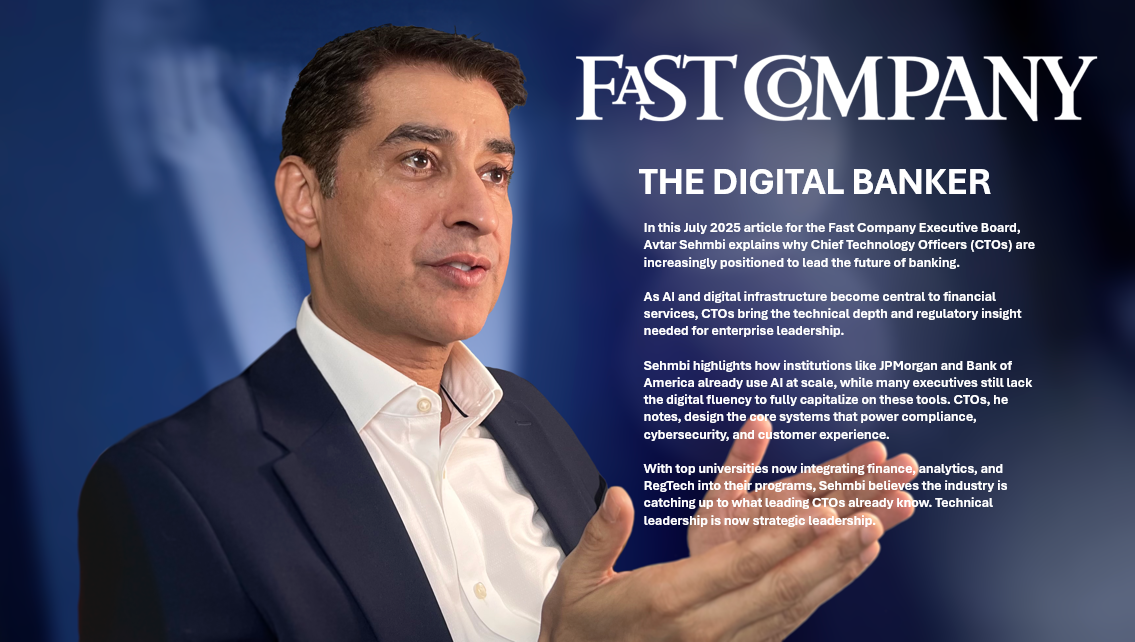In this July 2025 article for the Fast Company Executive Board, Avtar Sehmbi of the Forbes Technology Council explains why Chief Technology Officers (CTOs) are increasingly positioned to lead the future of banking.
LONDON, GB / ACCESS Newswire / July 17, 2025 / Artificial intelligence (AI) and other emerging technologies are reshaping banking by automating tasks, enhancing data analysis, and enabling personalized services. These tools improve risk management, streamline operations, and boost profitability. Institutions like JPMorgan Chase and Bank of America are already leveraging AI for fraud detection, customer service, and advanced analytics. Meanwhile, AI-powered hedge funds and neobanks use technology to deliver tailored experiences and outperform their peers.

Fast Company Avtar Sehmbi the Digital banker
This shift isn't theoretical; it's already well underway. Digital systems are fully embedded into the everyday operations of financial institutions, and technical fluency has become a defining leadership trait. Familiarity with these technologies is no longer optional. Executives who lack hands-on insight into digital transformation risk falling behind in an increasingly tech-driven industry.
WHY THE CTO IS THE MOST PREPARED TO LEAD BANKING TRANSFORMATION
One of the greatest barriers to innovation in banking is the workforce's limited exposure to new technologies. Many professionals still lack formal training in AI, blockchain, and analytics, making it difficult to adopt disruptive digital tools and fully leverage fintech innovations. As a result, institutions often fail to realize the full return on their technology investments or fall behind the marketplace.
This gap highlights why the CTO is increasingly central to leadership in modern banking. Unlike many senior executives who focus solely on strategy, CTOs bring unmatched technical depth, architectural expertise, and operational command. They don't just imagine the future of banking. They build it.
From core infrastructure to compliance frameworks, every major digital component of the modern bank is influenced by the CTO. They design and implement the systems that underpin fraud detection, data pipelines, onboarding flows, and customer engagement channels. This work also ensures that regulations are embedded directly into software, cybersecurity is tightly woven into business processes, and platforms deliver secure, scalable services.
Because they oversee these systems from end to end, CTOs have a comprehensive understanding of how the bank truly operates. Their ability to integrate, optimize, and future-proof these systems gives them a uniquely qualified perspective. They are not just prepared to lead technology. They are prepared to lead the enterprise.
EDUCATION IS CATCHING UP TO WHAT THE CTO ALREADY KNOWS
Top academic institutions such as Oxford, MIT Sloan, the National University of Singapore, Frankfurt School, and INSEAD are responding to the sector's transformation. Their new programs blend finance, analytics, cybersecurity, and regulatory technology, reflecting a growing recognition that tomorrow's financial leaders will need the interdisciplinary expertise that CTOs bring to the table.
To meet the evolving demands of the industry, business schools like those mentioned above now offer integrated degrees that combine finance with computer science, data analytics, and RegTech. Financial institutions can support this effort by co-developing certification programs and practical training focused on digital risk and fintech operations, fields where CTOs already excel.
Modernizing the education pipeline will help develop future leaders with the fluency and systems thinking already demonstrated by today's top CTOs. As the industry continues to transform, these qualities will become essential.
THE CTO'S EDGE IN LEADING THE DIGITALLY DEFINED BANK
Technologies like AI, blockchain, and decentralized finance (DeFi) are now integral to banking. However, without effective leadership, many institutions fail to maximize their technology investments. Research shows that poor AI adoption alone can reduce returns by 30% to 50% due to misalignment between tools, talent, and strategy.
CTOs offer a systems-level perspective that few other executives can match. They understand how platforms, protocols, and processes intersect across functions. They embed compliance into code, build end-to-end workflows, and break down silos to accelerate innovation. This ability to execute across departments gives them a decisive advantage in leading the digitally defined bank.
Their fluency in technology, operations, finance, and regulation allows them to lead transformation at scale. Unlike other executives who may delegate technology, the CTO is hands-on and directly involved in aligning systems with business goals.
As digital infrastructure begins to shape everything from customer onboarding to lending models, the next generation of banking leaders must be equally fluent in financial operations and technology platforms. The CTO already embodies this hybrid leadership profile.
CONCLUSION: FROM BUILDER TO CEO
In tomorrow's boardroom, the CTO will not just support the CEO; they may be the most qualified to become the CEO. As banks become fully digital, CTOs hold a unique advantage. They not only see what's coming next but also have the detailed operational knowledge to build and launch it first. Their experience architecting the core infrastructure of modern banking, embedding compliance into code, and managing transformation from the ground up gives them unmatched strategic and executional range.
The future banker must understand not only markets and products but also the platforms, systems, and security protocols that power financial services. CTOs already work at this intersection. Their hands-on command of technology, coupled with insight into risk and regulatory demands, positions them to lead banks into a smarter, faster, and more secure financial future.
Contact Information
Avtar Sehmbi
Global CTO | COO | Forbes Technology Council | Fast Company Executive Board Member
avtarsehmbi@outlook.com
+447481825362
SOURCE: Avtar Sehmbi
View the original press release on ACCESS Newswire:
https://www.accessnewswire.com/newsroom/en/banking-and-financial-services/the-digital-banker-1049694
